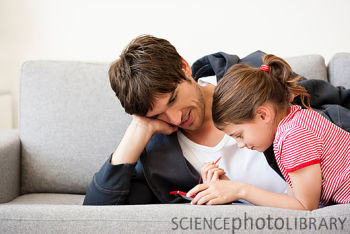据美国媒体9月27日报道,美国一项最新研究显示,与无儿女的男子相比,成为父亲的死于心脏问题的可能性较低。

这项研究由美国国家癌症研究所主办,对逾50万名50岁以上的美国退休人员协会会员进行了长达10多年的追踪记录,是目前最大规模的关于男性生育率和死亡率的调查研究。研究人员排除了至今尚未结婚的会员以及调查开始时就已患有心脏疾病的会员,最后剩下137903名会员。在10年的调查过程中,92%的受访会员有孩子,并且一半拥有超过3个孩子,另有10%的会员去世。
研究人员根据受访会员育有孩子的数量统计了他们的死亡率,同时根据吸烟、体重、年龄等因素进行了调整。研究显示,在死亡率上,无儿女的男子与成为父亲的男子并无差别,但是在死于心血管疾病的案例中,成为父亲的男子比无儿女的男子少约17%。专家表示有充足的理由认为是否当爸爸与心脏病死亡率有关。
先前有调查表明,结婚、有很多朋友及拥有宠物狗可以降低心脏病的死亡概率。与之相似,孩子能够照顾父亲,缓解父亲的工作压力,也给了父亲一个关心他自己身体的好理由。此外,生育能力与身体健康密切相关,“不育的男性身体更弱,患心脏病的风险也更高,”研究小组负责人迈克尔·艾森伯格说。
对这项研究,许多专家持不同观点。加利福尼亚州的埃里克·托波尔博士认为:“这确实可以反映一些问题,社会学家支持这个观点。”不过,宾夕法尼亚大学预防心脏病学主任丹尼尔·雷德表示,他不会以这项研究为基础,建议男子去多生孩子以降低死于心脏病的几率。(来源:中国日报网)
生物探索推荐英文论文摘要:
Fatherhood and the risk of cardiovascular mortality in the NIH-AARP Diet and Health Study
BACKGROUND Fertility potential and reproductive fitness may reflect a man's future health, given that over one-third of the male human genome is involved in reproduction. We sought to determine if offspring number predicts cardiovascular death in the US men.
METHODS Using data from the NIH-AARP Diet and Health Study, 137 903 men (aged 50–71) without prior cardiovascular disease were followed-up for an average of 10.2 years. International Classification of Diseases, ninth edition, codes were used to establish the cause of death, and multivariable Cox proportional hazards modeling was used to estimate the association between offspring number and cardiovascular death while accounting for sociodemographic and lifestyle characteristics.
RESULTS Almost all (92%) participants had fathered at least one child and 50% had three or more offspring. A total of 3082 men died of cardiovascular causes during follow-up for an age-adjusted incidence rate of 2.70 per 1000 person-years. Compared with fathers, after adjusting for sociodemographic and lifestyle factors, childless men had a 17% [hazard ratio (HR): 1.17; 95% confidence interval (CI): 1.03–1.32] increased risk of death from cardiovascular disease contracted in the study period, and this elevated risk appeared to extend also to men with only one child. In comparison with fathers of five or more children, adjusted relative hazards for cardiovascular mortality of this sort were 1.06 (95% CI: 0.92–1.22) for four children, 1.02 (0.90–1.16) for three children, 1.02 (0.90–1.16) for two children, 1.11 (0.95–1.30) for one child and 1.21 (1.03–1.41) for no children.
CONCLUSIONS Married men who have no children have a higher risk of dying from cardiovascular disease contracted after the age of 50 than men with two or more children.







